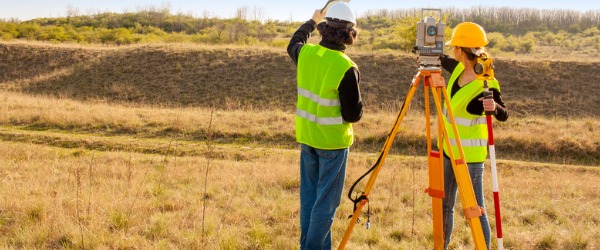What is a Surveyor?
A surveyor is someone who establishes official land, airspace, and water boundaries. Surveyors work with civil engineers, landscape architects, and regional and urban planners to develop comprehensive design documents. They work outdoors in many types of terrain, and they also work indoors to prepare legal documents and other reports.
What does a Surveyor do?

Surveyors typically do the following:
- Measure distances, directions, and angles between points on, above, and below the earth's surface
- Select known reference points and then determine the exact location of important features in the survey area using special equipment
- Establish official land and water boundaries
- Research land records and other sources of information affecting properties
- Look for evidence of previous boundaries to determine where boundary lines are
- Travel to locations to measure distances and directions between points
- Record the results of surveying and verify the accuracy of data
- Prepare plots, maps, and reports
- Work with cartographers (mapmakers), architects, construction managers, and others
- Present findings to clients, government agencies, and others
- Write descriptions of land for deeds, leases, and other legal documents
- Provide expert testimony in court regarding their work or that of other surveyors
Surveyors guide construction and development projects and provide information needed for the buying and selling of property. Whenever property is bought or sold, it needs to be surveyed for legal purposes. In construction, surveyors determine the precise location of roads or buildings and proper depths for foundations and roads.
In their work, surveyors use the Global Positioning System (GPS), a system of satellites that locates reference points with a high degree of precision. Surveyors interpret and verify the GPS results. They gather the data that is fed into a Geographic Information System (GIS), which is then used to create detailed maps.
Surveyors take measurements in the field with a crew, a group that typically consists of a licensed surveyor and trained survey technicians. The person in charge of the crew (called the party chief) may be either a surveyor or a senior surveying technician. The party chief leads day-to-day work activities.
What is the workplace of a Surveyor like?
Surveying involves both field work and indoor work. Field work involves working outdoors, standing for long periods, and walking considerable distances. Surveyors sometimes climb hills with heavy packs of instruments and other equipment, and are exposed to all types of weather. Surveyors also do many tasks indoors, including researching land records, analyzing field survey data, mapping, presenting information to regulatory agencies, and providing expert testimony in courts of law.
Travelling is sometimes part of the job, and surveyors may commute long distances or stay at project locations for a period of time. Surveyors usually work full time. They may work longer hours during the summer, when warm weather and long hours of daylight are most suitable for field work.
Frequently Asked Questions
What are Surveyors like?
Based on our pool of users, surveyors tend to be predominately investigative people. Their responsibilities speak clearly to this characteristic. Measuring contours, depressions, elevations, distances, longitudes, and latitudes is precise work that calls for an analytical, exploratory, and probing mind.
How long does it take to become a Surveyor?
Most surveyors enter the field after earning a four-year Bachelor’s degree. Those who opt for a two-year Associate’s degree or seek employment with only a high school diploma face significantly longer roads to licensure and commonly confront greater competition for jobs.
Are Surveyors happy?
Surveyors rank among the least happy careers. Overall they rank in the 23rd percentile of careers for satisfaction scores. Please note that this number is derived from the data we have collected from our Sokanu members only.
There are no statistics or other data available to explain this low happiness metric among surveyors.
Steps to becoming a Surveyor
Perhaps the very first step in becoming a surveyor is realizing that you can visualize objects, distances, sizes, and abstract forms; that you are good at algebra, geometry, and trigonometry; and that you like solving mysteries and puzzles. Of course, establishing a career in surveying requires much more. It requires a commitment to learning, professional development, and potentially, specialization.
Should I become a Surveyor?
Surveying may be the perfect career for individuals who possess math skills; have an interest in geography, science, or information technology; and like the variety of working both indoors and outdoors. The following additional personal characteristics and abilities can also serve to lay a foundation for a potential career in surveying:
Ability to visualize objects, distances, and sizes Ability to work with precise electronic instruments Surveyors identify the exact locations and relative positions of natural features on the earth’s surface, underground, and underwater. They use complex equipment to determine points of elevation and contours in the land.
Strong research, analytical, reporting, and organizational skills Surveyors are required to collect and analyze data and prepare drafts, drawings, and comprehensive reports concerning survey findings.
Computer literacy and interest in learning new technologies and software Surveying demands an aptitude for working with highly sophisticated computers and software and a solid knowledge of applied mathematics.
Ability to work effectively independently Surveying technology has driven the industry’s fieldwork and data collection toward a one-person operation.
Advanced communication skills and ability to work in a team environment Surveyors liaise with a variety of other professionals, including civil engineers, geodetic technologists, land development planners, construction supervisors, and other specialists. They may also be called upon to supervise unlicensed assistants,
Time management skills Surveyors must often meet deadlines set by project schedules.
Individuals considering a career in surveying may find themselves employed by: Construction and mining companies Architectural and engineering firms Real estate development companies Geomatics firms Professional surveying companies Federal, state, and municipal government agencies
Surveyors are also known as:
Land Surveyor
Licensed Land Surveyor
Professional Land Surveyor